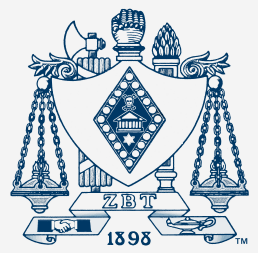Features
The Gentleman’s Code
By Andrea (Smithson) Benek — Issue: Fall 2017
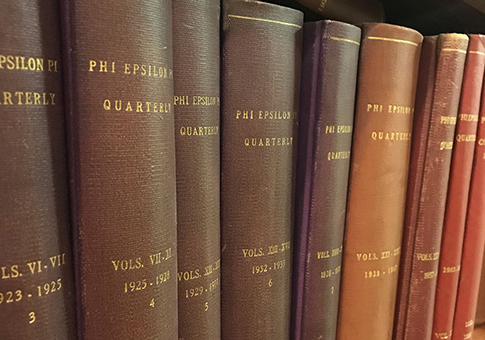
The Gentleman’s Code of Phi Epsilon Pi and, now, Zeta Beta Tau, has a fascinating 80-year history. Earlier this year, ZBT re-committed to this philosophy originally used by the antecedent group.
The Gentleman’s Code
A ZBT is always a gentleman! A ZBT commands respect and gives respect at all times and under all circumstances.
This very simple statement stresses the maintenance of unimpeachable standards of behavior and good citizenship expected of ZBT brothers — just as brothers commit to the four tenets of the Credo and the values of our Ritual.
International Vice President Jonathan D. Frieden, Esq., Phi Epsilon (University of Virginia) 1994, has been the key motivator who worked to return the code to prominence in ZBT this year. The Supreme Council passed a motion to re-commit to the statement earlier this year.
“I joined the Fraternity as part of an independent Phi Epsilon Pi chapter, and we had to memorize the Gentlemen’s Code as new brothers. It struck me at the outset as a very simple recitation of the expectations of a fraternity man,” International Vice President Frieden said. “I’ve now been involved with the international organization for a long time, and as I consider a lot of the issues that we deal with worldwide, I find that oftentimes the problems that fraternity men run up against are simple situations where they forget to act as gentlemen. That’s when they run into problems.”
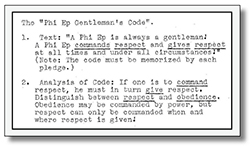 The Gentleman’s Code falls in line with ZBT’s traditional saying that “a ZBT” is synonymous with “gentleman.”
The Gentleman’s Code falls in line with ZBT’s traditional saying that “a ZBT” is synonymous with “gentleman.”
These ideals have been with our Fraternity for many decades. The text of the Gentleman’s Code, however, was formalized in 1937 when Phi Epsilon Pi’s leadership updated their new member education materials for the first time since the organization’s founding in 1904.
Phi Ep national officer Rabbi L. Elliot Grafman, Omega of ΦEΠ (University of Cincinnati) 1921, worked with other fraternity leadership in the mid-1930s to re-write the education manual alongside other sweeping reforms to the program. Many of these changes were oriented toward making Phi Ep’s Ritual and values more inclusive of broader community values of the time, moving away from a specific Jewish experience. While Jewish in origin, Phi Epsilon Pi had been nonsectarian on principle from its founding.
The concept of a Gentleman’s Code was popular with other — non-Jewish — fraternities at the time.
With the rising tide of anti-Semitism in these years that immediately preceded World War II, Rabbi Grafman and Phi Epsilon Pi’s leadership felt this type of messaging could help the entire Jewish community to deflect and prevent lethal manifestations of prejudice in the shadow of Adolph Hitler’s rise to power.1
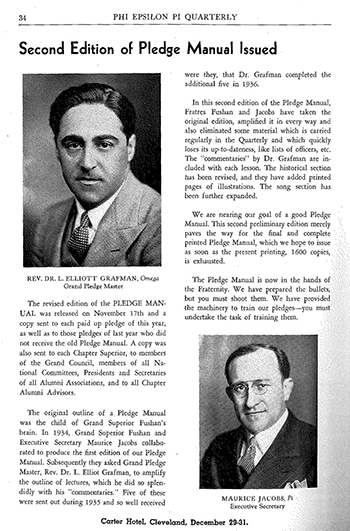 “It’s truer than most men realize — especially when they are Jews — that they reflect in themselves the demands and achievements of their social groups. The man who remembers this is clothed with the necessary armor,” Brother Grafman wrote in a note to then-Phi Epsilon Pi Executive Secretary Maurice Jacobs, Pi of ΦEΠ (University of Maine-Orono) 1917.
“It’s truer than most men realize — especially when they are Jews — that they reflect in themselves the demands and achievements of their social groups. The man who remembers this is clothed with the necessary armor,” Brother Grafman wrote in a note to then-Phi Epsilon Pi Executive Secretary Maurice Jacobs, Pi of ΦEΠ (University of Maine-Orono) 1917.
Phi Epsilon Pi was not alone among the fraternal community in these concerns about the behavior and standards of brothers.2 ZBT Executive Secretary Lee D. Dover, Alpha Delta (University of Southern California) 1925, who was among the primary architects of the Zeta Beta Tau we know today, wrote ZBT’s first published chapter administration manual in 1937 with these values in mind. At ZBT’s 41st Convention in San Francisco, Fraternity leadership discussed these concerns publicly and the message to brothers was clear:
“No man has the privilege of wearing our badge unless he is a gentleman,” said Brother James Klaztman, Omicron (Syracuse University) 1919, then International President of ZBT.
ZBT, Phi Epsilon Pi and many brothers and fraternity men went to war in the next few years to fight for freedom and the safety and well-being of all humans. While the concept of conformity may have been misguided in the 1930s, the idea that all brothers should be held accountable to each other and should respect themselves and those around them remains a key value of fraternalism.
Eighty years later, the rising tide of anti-Semitism and racism growing in today’s world has ZBT brothers fighting a new battle to ensure this level of respect for all.
“The Gentlemen’s Code came out in a period in history where fraternity men had to be above reproach because they were being highly scrutinized, unfairly,” International Vice President Frieden said. “Again, we are dealing with this level of unfair scrutiny of the fraternity system. The Code is a good reminder of the standards we must uphold.”
In this light, the original concept behind the Gentleman’s Code rings true. Phi Epsilon Pi’s 1937 new member materials explains:
Analysis of the Gentleman’s Code
If one is to command respect, he must in turn give respect. Distinguish between respect and obedience. Obedience may be commanded by power but respect can only be commanded when and where respect is given!
It’s part of the code to give the BEST that’s in us and it applies to us all. Mutual respect is the very basis of the higher plane of camaraderie all Phi Eps seek.
This is a standard of social conduct approved and practiced by all Phi Eps.
Today’s brothers know that respect is a standard of personal integrity, the framework by which the individual maintains honesty, exhibits loyalty and retains a sense of self-discipline. Brothers have a social responsibility to commit themselves and accept their role as citizens of the world.
 |
 |
 |
“We must remember that as ZBTs we have a certain expectation in terms of our conduct. When you wear our letters, there’s a certain way to act,” International Vice President Frieden added.
Brothers have a social responsibility to commit themselves and accept their role as citizens of the world.
“This very simple statement, the Gentleman’s Code, stresses the maintenance of unimpeachable standards of behavior and good citizenship expected of ZBT brothers — just as we commit to the four tenets of the Credo and the values of our Ritual,” said International President Norman M. Waas, Esq., Alpha Omega (University of Miami) 1982, during the 2017 International Convention.
The Gentleman’s Code might be simply described as reinforcing “Brotherly Love” — respectful interrelation of the individual with his fellows.
1: Going Greek: Jewish College Fraternities in the United States, 1895-1945, July 10, 2003, by Marianne R. Sanua
2: The Quarterly of Phi Epsilon Pi, 1937, via ZBT archives
 Spring 2025
Spring 2025  Fall 2024
Fall 2024  Spring 2024
Spring 2024 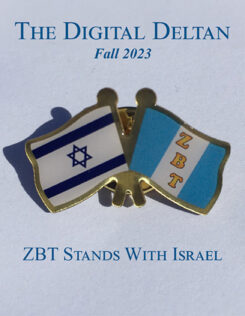 Fall 2023
Fall 2023 